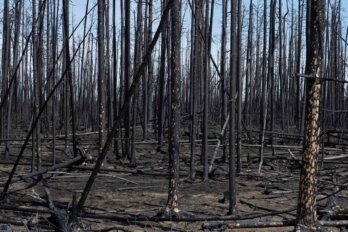We’re not going to put our negotiating strategy in the front window.
—John Baird, December 12, 2007, United Nations Climate Change Conference, Bali, IndonesiaThe Bush administration doesn’t give a rat’s ass about the environment in the Arctic, but they do care about protecting their national security.
—Michael Byers, author of Intent for a Nation: What Is Canada For?, December 12, 2007, ArcticNet conference, Collingwood, Ontario
In February 2006, with the huff and puff of the election campaign behind him, I imagine that Prime Minister Stephen Harper settled into his chair, thought for a moment, and discovered useful, even admirable aspects of the Liberal Party record. Most useful perhaps was the Liberals’ laggard approach to global warming. Most admirable certainly was the Security and Prosperity Partnership of North America—a fancy title for a “dialogue” to extend nafta and pave the way for a fully integrated approach to continental energy and security. Harper embraced this with enthusiasm, and that summer he put Conservative meat on the Liberal skeleton.
Before an audience of business leaders in London, England, on July 14, 2006, in advance of the G8 summit and with Russia’s Vladimir Putin singing the virtues of energy nationalization, Harper thundered that Canada would be “a global energy powerhouse.” He spoke obliquely about alternative energy—“Our government is making new investments in renewable energy sources such as biofuels”—but committed Canada to the fossil fuel economy. “[Alberta’s] oil sands are the second-largest oil deposit in the world, bigger than Iraq, Iran, or Russia, exceeded only by Saudi Arabia. Digging the bitumen out of the ground, squeezing out the oil and converting it into synthetic crude… requires vast amounts of capital, Brobdingnagian technology, and an army of skilled workers.” But Canada is “a great place to do business,” Harper intoned. It is ordained.
Last November, in a clear merging of two files, the economy and the environment, the prime minister told Commonwealth leaders gathered in Kampala, Uganda, that Canada would only accept “aspirational targets” on the reduction of greenhouse gas emissions. Thus, from his perspective, the subsequent United Nations Climate Change Conference was a sideshow. With the Alberta energy royalties issue settled, Mackenzie River oil and gas developments coming on stream, and the limitless growth agenda coming down from on high, Environment Minister John Baird was dispatched to Indonesia to Bali dance, stick to Canada’s current needs, and reassure the American delegation that we are committed to providing the US with the energy security it craves. For its performance at Bali, Canada received many “fossil of the day” awards. But the real action was taking place elsewhere.
A few days after the conference, Enbridge, Canada’s largest oil pipeline company, and ExxonMobil, the world’s largest public oil and gas company, announced plans to extend the Alberta-to-Illinois pipeline system to Houston, the heart of the US oil refinery business. It’s a bold move that just might be trumped by big player Kinder Morgan’s bid to build a direct Alberta-to-Texas pipeline. Forget the naysayers—there’s oil to burn, baby! Perhaps owing to Venezuela’s being bellicose as always and too-expensive Mexican oil, Enbridge ceo Patrick Daniel said he will not “sit idly by” during this moment of intense competition for natural resources, American need, and Canadian capacity. At least this road map is clear: push on, push on, the future is bright and bountiful.
On global warming, from a historical and internationalist perspective, it was the 1997 meeting in Kyoto, Japan, that was promising. There and then, the past was taken seriously, and the UN was accorded its due as the only body capable of coordinating a global consensus. Having caused or greatly accelerated global warming by belching carbon-laced pollutants into the atmosphere for some 200 years, the developed world agreed to take the lead in reducing greenhouse gas emissions. Even the US, its economy wedded to consumption and its belief in the growth model limitless, signed the Kyoto Protocol. It failed to ratify the accord, of course, upon hearing from global warming skeptics and domestic hawks who insisted that (as the beacon of light for the world) America should never subject itself to international tribunals. Nonetheless, for those onside, January 1, 2008, was the date on which targets would begin to be met in reducing emissions based on 1990 levels. In a reasonable accommodation, the developing world (India, China, etc.) would later follow suit. Words often spoke louder than actions; there were foot-draggers, to be sure. But as centres of environmental innovation emerged—gaining green technology jobs while cutting emissions—the future looked almost hopeful. Perhaps others would follow these leads. Perhaps an international agreement backed by international law was achievable.
Then came 9/11 and the rut and rot we are still in. Twin merchants of fear—al Qaeda, the attacker, and the US, the aggrieved and aggressive responder—have dominated the world ever since, distracting us from clear and present environmental dangers. Fossil fuel redoubts Canada and Russia ratified Kyoto in 2002 and 2004, but we prevaricated, while Russia became a CO2 superpower. Nature marched on. Recent nasa satellite images prove that early-fall Arctic sea ice is half what it was just four years ago. Last summer, the Greenland ice sheet lost 17 billion tonnes more ice than in any previous summer on record. Sea levels are rising, forest fires are increasing in number and ferocity, methane gas is escaping from thawing permafrost. And how are those with means responding to such calamities? They are investing in private security, a growth industry whose tentacles stretch far beyond green technology start-ups.
Whereas a short decade ago the past propelled many to act in a coordinated fashion, in North America today we exist in a fearful, greedy present, and broad consensual agreements are less and less likely. Here, it is all about growth and homeland security, about Osama bin Laden poling a gondola up Ottawa’s Rideau Canal or down Washington’s Potomac. And judging by the surge of venture capital investments in surveillance and emergency response companies, it is about private security against global warming. Rather than deal with the issue, our new modus operandi is to build safe havens, fortresses against the gathering storms. Like terrorism, if the environment is hostile to our interests it must be defended against, if not subdued.
Based on this galloping separation between man and nature, and the discrediting of the UN at Bali in December, a remedial course in global warming appears necessary. Let us begin with the poets.
Many writers chronicled the widening gap in thought and feeling between town and country as England edged toward industrialization some 200 years ago. The dislocations were real, but as the “dark Satanic Mills” moved in, the romantic notion that we are lost when divorced from the environment was lampooned as a quaint remembrance of times past. Anxious about emergent America and eager to assert its imperial advantage, British high society embraced the guiding narratives of exploitation and technological innovation.
William Blake’s sombre descriptions of the devastation wrought by industrialization found their prose counterpart in Charles Dickens, who portrayed the clustering of humanity in less-than-humane cities: crofters lost among the slag heaps, cold steel, heartless tycoons, and wayward street gangs. But change is an intoxicant, and when historical forces demanded it, the tried and true gravitated to the new paradigm with lust in their eyes. Like others, Britain moved on and up. In this era of globalization, market capitalism, international trade, and limitless growth (for some) gained acceptance, and the world divided again into haves and have-nots, into the developed and the backward.
Had the whole world leapt onto the train of progress, all would be lost. Hence, the pastoralism of romantics was censured at home but celebrated offshore. Intrepid travellers visited the Far East, Africa, South America, and strange archipelagos, seeking out local flora and fauna for motherland exhibits, or these anachronisms were simply exploited for indentured servants and resources, or used as dumping grounds for criminals and other toxic refuse.
Kyoto in 1997 was mindful of this history; Bali in 2007 denied it. No useful road map was agreed upon, because new calibrations had been made. And the top prize for this decade’s global warming recalcitrant goes not to the US, but to less-predictable Canada. We took heat for insisting that “all or none” must play at reducing greenhouse gas emissions, but there was more to it than that. At Bali, Canada framed itself as Britain, circa 1800: a developing country, not yet industrialized, even backward, and its own and as a result the world’s environmental hereafter will be sacrificed for the economic here and now.
This positioning—Canada like Britain then, like India and China today—was a stroke of strategic genius, and as markets remain volatile and we settle down to do our taxes, Harper believes it will sell. How might his vision work?
Our national self-image suggests that we are a pastoral people, in love with nature. Poppycock, says Harper. The migration to cities may be a global phenomenon, and half of the world’s people may now reside in large clusters, but in Canada 80 percent of us call concrete, steel, and skyscrapers home. Rich folks summer in Muskoka, the Eastern Townships, and the Okanagan Valley, but beyond visitation rights born of privilege into these “natural worlds,” and beyond aboriginal mythologies, our true environmental record is one of wanton disregard. Harper knows this, admires it, and is tapping into our dark corners (the ones we sublimate in polite company), and into our demand for winter heat and summer air conditioning at prices to which we have grown accustomed. The world can change, says Harper, Europe can go mushy and eco-friendly, California and Quebec can adopt clean car legislation, but our underpopulated hinterlands house vast untapped natural resources, and exploit these we will. Canada is the little empire that could, and nothing will hold it back.
Urbane professionals proclaim the “idea economy,” create think tanks, and chase the low-hanging fruit of enviro-retrofits, reduced packaging, and local agriculture; they insist that the service, information, and culture sectors—not natural resource wealth—are the keys to sustainable prosperity. “God save our green,” they say, and local urban initiatives are implemented. But such good efforts have been overwhelmed by Harper’s maximalist agenda: loaded with fossil fuels, and with oil at $100 (US) a barrel, Canada will be “a global energy powerhouse,” our very own manifest destiny.
It won’t happen overnight—the tar sands that spread from northern Alberta to northern Saskatchewan are largely untapped; the natural gas of the Mackenzie River region still needs to be extracted; aboriginal bands and ecotourists might demand that more distant acreage be turned into national parks. But the way forward has been established, and it is about oil, gas, nukes, and roughneck development, not hydrogen fuel cells, wind and solar power, or (perish the thought) reduced consumption. It is about Canada’s industrial revolution, located north of any major population centre, out of sight, “the True North, strong and free.”
Our federal strategy is obvious: global warming affects different regions of the world differently, and it happens to benefit Canada. So we’ve cocked a snook at hard caps on greenhouse gas emissions, offered the useless bone of “aspirational targets,” and argued that special “national circumstances” must allow Canada out of binding international agreements. In Bali’s aftermath, Canada signed secondary agreements that, absent hard numbers and a global consensus, will simply prolong the dance. Before Christmas, Harper promised to impose regulations that will force Canadian industries to reduce their greenhouse gas emissions by 18 percent by 2010. The measuring stick for progress, however, will be reductions based on 2006 levels, not 1990’s, and few environmentalists believe that such restrictions will turn back the global warming clock.
Big sacrifices are for others, not for us. We look sincere at workshops on carbon sequestration and agree to technology transfers to underprivileged countries (business is business) while ramping up the nukes and extraction industries and shrewdly picking our bedmates (China, India, the US). On global warming, international accords with teeth, and mandating green innovation, Canada is an opt-out nation: like the US, it will make small concessions but be bound by little, if anything.
The melting of the Greenland ice sheet will flood low-lying islands and may force St. John’s and Halifax to erect sea walls. These are unfortunate but manageable results. Abrupt climate change remains a good thing, thinks Harper, and if leading scientists say we have just only ten years before more powerful hurricanes lay waste to islands and peninsulas, earthquakes demolish homelands, and the world’s biosphere starts to take an annual pounding, then our response must be to build fortresses, invest in private security, and bring it on. Canadians will be warmer, Florida submerged, and snowbirds will stay home and spend. As the Gulf Stream weakens and slows due to increased meltwater, Europe will go cold, and the purse dogs of Paris, their teeth clattering, will stop yapping. Pity about Britain, but when you are remaking history some friends get left behind. (Besides, once noble and treacherous, Britain has committed itself to wind power off its coasts—a clear sign that it has blinked, become fey, that there is weakness within.)
With our tar sands, natural gas, and stockpiles of uranium; with our bounty, our dreams, and our buyer—the US, infinite in appetite, with a rapidly growing population, and with investment dollars desperate for an energy home nearby—Canada has made a decision: to rebuff those pesky Europeans, and to provide energy security to the US. Continentalism, finally, under the US umbrella, where Canada will thrive—the UN and its attempts at world government be damned.
Harper sent John Baird and select minions (including executives from favourable corporations) to Bali to dance a jig of convenience with straw men (India, China, Brazil, et al.) and marriage partners (the US and Japan). Had he instead recognized the genuine concerns of developing nations and seized the opportunity to isolate the US, Kyoto II might have a road map with signposts and direction. Even perennial bad boy Australia, with its new Labour government, was onside, leaving only the US, Japan (with its US-tailored constitution), and Canada as outliers. Out of self-interest, we provided protective cover for a vulnerable and reviled US based on the crudest calculus: Canada provides; the US buys. One North America, united against the world, was and is Canada’s unstated position.
Under Harper, Canada is hardly naive, as has been suggested. Rather, it has graduated to the realm of realpolitik, and is now clever in a way few Canadians recognize—truly Machiavellian. With our international reputation as a green society shattered, we have become a nasty brute of a country, and Harper is proud of it. Bully for us. Canada, the middle power negotiating between Goliaths? The global diplomat? Hardly. Canada is smug at home and a global saboteur.
As the Bali dance neared its conclusion, former US vice-president and Nobel Prize winner Al Gore lectured his homeland for killing the process, an “inconvenient truth,” he declared (and shilled). The time is nigh, Gore argued, but have faith: by 2009, the US under the Democrats will play ball with the world. It was a cri de coeur forgotten by the next evening as UN climate chief Yvo de Boer fled the stage in tears from the stress of it all.
It’s easy to imagine the ensuing conversation. In the shadows of a hotel lobby, the Canadian delegation approached the American: “Just tell George that we’ve got his back, that our line is ‘aspirational targets by 2050,’ that we are one. The UN is finished. Looking forward to the US-sponsored talks. Your road map should be a country highway leading through our spare wilderness to oil and gas in the high Arctic. Alaska’s Prudhoe Bay may be a natural gas motherlode, but our tar sands are infinite. Mackenzie is on, and soon the pipelines will flow. As Russia has its own designs on the North, we might need some of your gunboats.”
On December 19, 2007, a resplendent George Bush signed the Energy Independence and Security Act into law. Among other tiny steps, it calls for greater automobile fuel efficiency by 2020. His administration looking less inept, less cartoonish, dangerous again, this was Bush’s nod to Bali, a final jig before retiring to his ranch in Texas. He couldn’t have done it without Canada. It was ordained.





